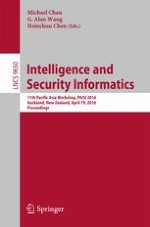2016 | OriginalPaper | Buchkapitel
A Syntactic Approach for Detecting Viral Polymorphic Malware Variants
verfasst von : Vijay Naidu, Ajit Narayanan
Erschienen in: Intelligence and Security Informatics
Aktivieren Sie unsere intelligente Suche, um passende Fachinhalte oder Patente zu finden.
Wählen Sie Textabschnitte aus um mit Künstlicher Intelligenz passenden Patente zu finden. powered by
Markieren Sie Textabschnitte, um KI-gestützt weitere passende Inhalte zu finden. powered by
